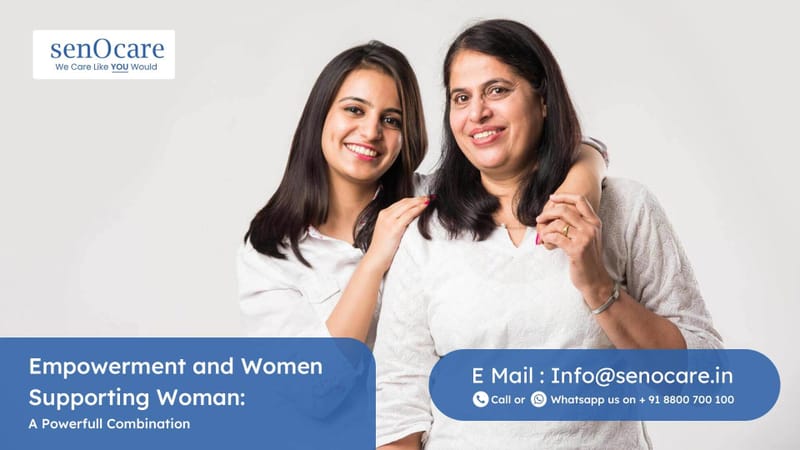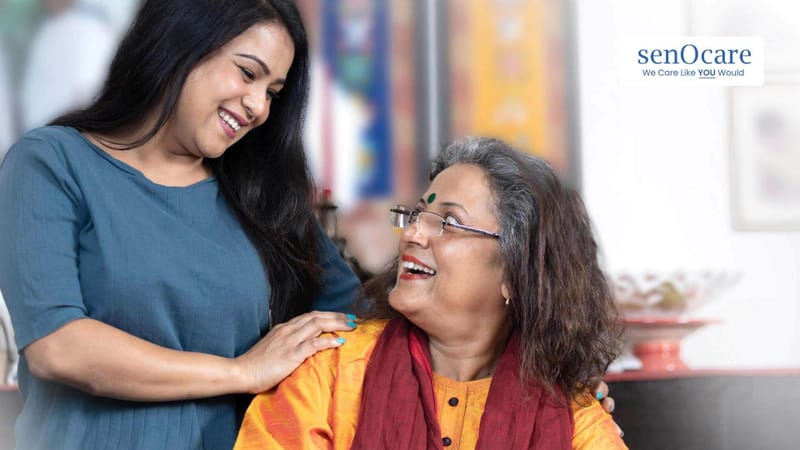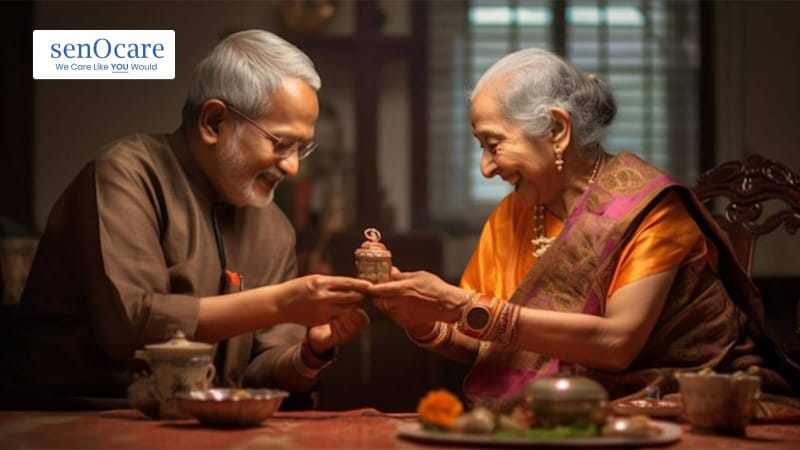International Women's Day is a global celebration of the social, economic, cultural, and political achievements of women. This year, let us not forget the crucial contributions that elderly women make to our families, communities, and the entire world.
Empowerment and Women Supporting Women: A Powerful Combination
Empowerment refers to the process of gaining or increasing the capacity to make one's own choices and to control one's life. In the context of women, this might involve:
- Gaining independence: Financial, emotional, or social independence from reliance on others.
- Having a voice: Feeling confident expressing opinions and participating freely in decisions.
- Reaching full potential: Having the opportunity and resources to pursue dreams and aspirations in all areas of life.

Women supporting women across different age groups is crucial because:
- Shared experiences: Older women can offer guidance and mentorship based on their life experiences, while younger women can bring fresh perspectives and energy.
- Collective strength: By uniting and supporting each other, women can create a powerful force for change and overcome systemic barriers.
- Breaking down stereotypes: Intergenerational collaboration can challenge the notion of competition between women and promote collaboration for collective progress.
This mutual support fosters a sense of community and empowers women of all ages to reach their full potential, ultimately creating a more equitable and just society.
The Strength in Sisterhood: Unity and Uplifting Through Life
The concept of sisterhood goes beyond blood ties, creating a tapestry of unity among women. This powerful bond transcends age, background, and circumstance, offering a wellspring of support and encouragement.
Supporting and uplifting one another throughout life's various stages forms the cornerstone of this strength. Let's explore how this plays out:
- Early Life: As young girls, navigating societal pressures and self-discovery, sisters (both biological and chosen) can offer a safe space for vulnerability, understanding, and celebrating each other's uniqueness. Whether it's dealing with schoolyard bullies or celebrating academic triumphs, shared experiences and a listening ear can help them tackle hurdles and realize their full potential.
- Adulthood: As women navigate careers, relationships, and personal growth, mentorship from older women plays a crucial role. Sharing knowledge and experience can help young women avoid traps, handle challenging circumstances, and make sound decisions. In contrast, younger women can contribute new viewpoints and technology savvy, enabling a dynamic exchange of knowledge and skills.
- Later Life: As women age, the power of compassion and understanding within a sisterhood shines brightly. Women facing similar challenges, such as changing health or cultural expectations, women can provide emotional as well as practical support, building a sense of belonging and making the journey easier.

This intergenerational support system goes beyond personal benefits. When women join together, their combined voice becomes an excellent tool for advocacy and change. Whether it's fighting for gender equality, social justice, or creating a more inclusive world, sisterhood gives women a platform to elevate their views and make a good impact on society at large.
In essence, the strength in sisterhood lies in the unity and support women offer each other throughout life's tapestry. Women empower and encourage one another, which not only leads to their own achievement but also opens the door to a better future.
Empowering the Next Generation: How Elder Women Can Mentor and Guide
Older women hold a wealth of experience and wisdom, making them invaluable mentors for the younger generation. Here are some ways they can empower and guide younger women:
Sharing Knowledge and Skills:
- Formal Mentorship Programs: Many organizations offer formal mentorship programs where older women can connect with younger women seeking guidance in specific fields. This allows for focused and structured knowledge transfer.
- Informal Mentoring: Sharing life experiences and offering advice in informal settings like coffee chats or social gatherings can provide younger women with valuable insights and perspectives.
Fostering Confidence and Self-Belief:
- Celebrating Achievements: Acknowledge and celebrate the accomplishments of younger women, whether big or small. This reinforces their confidence and motivates them to strive further.
- Sharing Personal Stories: Older women can share their own struggles and successes, demonstrating the importance of resilience and perseverance in overcoming challenges. This can inspire younger women to believe in themselves and overcome doubts.
Providing Support and Encouragement:
- Being a Safe Space: Offering a listening ear and a non-judgmental space for younger women to voice their concerns and aspirations can be invaluable. This builds trust and makes it easier for them to seek help.
- Advocating and Encouraging: Older women can be powerful advocates for younger women, using their experience and network to open doors and create opportunities for their mentees.
Remember:
- Active Listening: Mentorship is a two-way street. Actively listen to the needs, experiences, and aspirations of younger women to tailor the support accordingly.
- Respecting Individuality: Every woman's journey is unique. Avoid imposing personal beliefs or experiences on your mentee and encourage them to discover their own path.
- Building a Collaborative Relationship: Effective mentorship involves a sense of shared learning and growth. Encourage open communication and collaboration to foster a mutually enriching relationship.
By actively mentoring and empowering younger women, older women can play a crucial role in shaping the future. Their guidance and encouragement can help the next generation attain their full potential and positively contribute to society.
Wisdom from Experience: The Invaluable Contribution of Elder Women
The lives of older women are rich tapestries woven from experiences, both triumphs and trials. These experiences, often accompanied by reflection and learning, translate into wisdom - a powerful asset that brings immense value to society. Here's why:
- Perspective and Insight: Older women have witnessed societal shifts, technological advancements, and cultural changes firsthand. This historical context allows them to offer unique perspectivesand grounded insights on various issues.
- Problem-solving and Decision Making: Having navigated various challenges throughout their lives, older women possess exceptional problem-solving skills and the ability to make thoughtful decisions. They can approach situations with a calm demeanorand a broader perspective, offering valuable guidance in complex situations.
- Emotional Intelligence: Through life experiences, older women often develop a deeper understanding of human emotions and emotional intelligence. This allows them to empathize, communicate effectively, and provide support in a sensitive and nuanced manner.
- Institutional Knowledge: Decades of professional experience often endow older women with deep knowledge of specific fields or industries. This expertise can be invaluable in mentoring younger generations and ensuring the continuity of knowledge and skills within organizations.
Furthermore, the wisdom of older women goes beyond the individual level. Their collective voice may be a strong tool for advocacy and change. Older women may help to create a more equal and just world by sharing their ideas and experiences with policymakers, younger generations, and society at large.
In conclusion, the wisdom and experience of older women are priceless assets that should be valued and cherished. By recognising and valuing their contributions, we may build a culture that thrives on intergenerational knowledge and understanding.
Breaking Down Walls: How Women of All Ages Can Shatter Stereotypes
Societal stereotypes often categorize women based on age, limiting their opportunities and defining expectations that hinder their potential.However, women of all ages can join together to confront and break these harmful constructs, paving the way for a more inclusive future.Here are some ways they can do that:
Challenging the Narrative:
- Sharing Stories: By openly sharing their experiences and perspectives, women across different age groups can challenge the dominant narratives that perpetuate stereotypes. This allows them to showcase the diversity and individuality that exists within each age group.
- Debunking Myths: Engaging in open dialogue and challenging misinformed assumptions about different age groups can help dismantle harmful stereotypes. This can involve highlighting the strengths and capabilities of women across the generations.
- Embracing Collaboration: Age diversity within organizations and communities can create a powerful force for collective action. By working together on projects and initiatives, women can demonstrate the value of collaboration and dispel the myth of competition between age groups.
Redefining Success:
- Celebrating Diverse Achievements: Recognizing and celebrating the accomplishments of women across all stages of life can redefine what constitutes success. This can include emphasising the achievements of older women who are frequently forgotten, as well as showing the various pathways that younger women choose to take.
- Promoting Lifelong Learning: Encouraging and supporting the pursuit of education and skill development at all ages can dismantle the stereotype of age as a barrier to advancement.It indicates that learning is a continuous process in which women can grow and evolve throughout their lives.
- Embracing Age Positivity: Challenging the negative connotations associated with aging can foster a sense of acceptance and empowerment for all women. By promoting positive portrayals of aging women and celebrating their contributions to society, we can rewrite the narrative.
Ultimately, by working together, sharing their voices, and redefining success, women of all ages can create a future where age is just a number and women are free to pursue their full potential without the constraints of limiting stereotypes. This collaborative activity lays the path for a more fair and inclusive society in which all women are respected for their individual contributions.
Education: Fueling Women's Empowerment Across Life Stages
Education is a potent weapon in the fight for women's empowerment, empowering individuals of all ages to reclaim their agency and reach their full potential.It provides women with the knowledge, skills, and confidence they need to manage their lives, challenge conventional norms, and actively shape their own futures.
The Impact of Education:
- Economic Empowerment: Education unlocks opportunities for better-paying jobs, paving the way for financial independence. This allows women to support themselves and their families, breaking free from economic dependence and fostering greater control over their lives.
- Social and Political Participation: Education equips women with the tools to understand their rights, advocate for themselves and others, and actively participate in public life.This enables people to challenge social conventions, advocate for equality, and make important contributions to their communities.
- Improved Health and Well-being: Education empowers women to make informed decisions about their health, access healthcare services, and advocate for better health outcomes for themselves and their families. This allows individuals to challenge societal norms, push for equality, and make significant contributions to their communities.
Prioritizing Health and Well-being: A Journey Through Life's Stages
Physical and mental well-being are fundamental aspects of women's empowerment across all life stages. A healthy woman is better prepared to face life's obstacles, achieve her goals, and make important contributions to her family and community.
Importance Across Ages:
- Early Years: Establishing healthy habits in childhood lays the foundation for lifelong well-being. Promoting physical activity, healthy eating, and open communication about mental health are crucial during this formative period.
- Adolescence and Young Adulthood: Addressing issues like body image, menstrual health, and mental health challenges becomes central during this time. Open communication, access to credible information, and high self-esteem are critical.
- Adulthood and Middle Age: Balancing career, family, and personal health can be demanding. Prioritizing preventive healthcare, regular checkups, and stress management techniques are crucial to maintain well-being.
- Later Life: Maintaining physical activity, healthy eating habits, and social connections become increasingly important for physical and mental well-being. Regular health screenings and addressing age-related health concerns are also essential.
Maintaining Health Through Life Stages:
- Develop a personalized routine: Tailor your health and well-being practices to your specific needs and preferences. Explore various forms of exercise, develop good eating habits that work for you, and prioritise activities that offer you joy and relaxation.
- Build healthy habits: Focus on consistency over intensity. Incorporate small, sustainable changes into your daily routine, such as taking walks, incorporating fruits and vegetables into meals, and getting adequate sleep.
- Seek professional support: Don't hesitate to seek professional help for both physical and mental health concerns.
- Embrace self-care: Prioritize activities that nourish your mind, body, and spirit. This could include meditation, spending time in nature, connecting with loved ones, or pursuing hobbies.
Navigating the Tapestry: Different perspectives on women's empowerment across cultures
The concept of women's empowerment is a multifaceted tapestry, woven from the threads of cultural beliefs, traditions, and social structures. While the universal goal of women achieving their full potential remains constant, the pathways towards this goal vary significantly across different cultures.
Exploring Diverse Perspectives:
- Western Cultures: Often emphasize individual rights, gender equality, and economic independence as key elements of women's empowerment. This perspective focuses on dismantling systemic barriers and promoting equal opportunities for women in all spheres of life.
- Collectivistic Cultures: May prioritize family and community well-being over individual rights. Empowerment in these contexts might be focused on women's contributions within their families and communities, rather than solely on individual achievements.
- Religious and Traditional Societies: Some cultures have strong religious or traditional norms that define gender roles. While these norms may seem restrictive from a Western perspective, they might be viewed as sources of strength, security, and empowerment by women within those cultures.
Understanding Nuances:
It's crucial to avoid a one-size-fits-all approach when understanding women's empowerment across cultures. Ethnocentrism, judging other cultures through the lens of one's own, can be detrimental to understanding the diverse ways women navigate their roles and strive for fulfillment.
Seeking Common Ground:
Despite cultural differences, there are universal aspects to women's empowerment. These include:
- Access to education: Education empowers women with the knowledge and skills to make informed choices about their lives.
- Bodily autonomy: The ability to make decisions about one's own body, including reproductive health and freedom from violence.
- Economic opportunity: The ability to participate fully in the economy and achieve financial independence.
- Voice and participation: Having a voice and being able to participate in decision-making processes at all levels.
Moving Forward:
By recognizing the diversity of experiences and approaches to women's empowerment, we can foster cross-cultural understanding and collaboration. Engaging in polite discourse and learning from each other's viewpoints is critical in creating a more equal and just world for all women, regardless of ethnic backgrounds.

